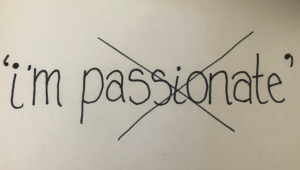Easy Tricks to Make Personal Statement Sound Smarter
Writing your personal statement can seem like a daunting task; how do you start? What do you include? How do you stand out? Don't worry; I've got your back.
It's easier to approach your personal statement when you think of it like a more detailed and personal version of your CV. In fact, if you open your CV in a tab alongside a Word document, your personal statement will practically write itself! Well, not quite... but you get the idea. Your personal statement needs to include the key WOW moments of your CV, but with a bit more about yourself, your values and your goals to compliment it.
Thinking back to when I wrote my personal statement (over a year ago now, Woah!), I managed to pull together five things that I found to be really important. Some of these tips are from what my teachers told me, and others are what I learnt during the process.
- Instead of going out with a bang, come in with one.
I know, you've always been taught to save that BEST BIT until last, right? To drop the mic and go out with a bang? Not this time. Unfortunately, admissions have to read a LOT of personal statements. Firstly, they are likely to skim over them pretty quickly, and secondly, if you don't grip them at the start, they might not even keep reading. (Although here at Bath the admissions team are all proud of the fact that they read ALL personal statements at least twice!). Imagine leaving a game-changing piece of information until the end and it never even gets read! Luckily for you, you can eliminate all chances of this happening by opening with that WOW factor instead.
Ditch the superfluous intro and dive straight in with your biggest relevant achievement or that really valuable and relevant bit of work experience you did. Grip the reader from the start so they definitely keep reading what else you have to say! If you can come in with a bang and go out with one, then great! But if it comes down to one or the other? I would personally definitely come in with one.
- Avoid the word 'passionate', at all costs.
This is something that my form tutor in school taught us. In fact, if he saw the word 'passionate' in one of our personal statements, he would immediately tell us to remove it. Why? It uses up your limited amount of characters and reveals nothing about you. Anyone can claim they are passionate about anything. Instead, show them that you are passionate by talking about the action you have taken.
If one person writes 'I'm passionate about science.' And the other writes 'I spent two weeks shadowing a scientist in a laboratory, with the opportunity to carry out practical's whilst writing a daily account of what I learnt', who are you going to believe is more passionate? The one who claims they are, or the one who shows they are?

- Don't be reliant on a thesaurus.
It's easy to fall into the trap of thinking that by using a thesaurus on every adjective, you will sound super intellectual and sophisticated. Whilst it's okay to use it occasionally, using over-complicated words in every sentence may cause your writing to lose its flow and consequently, you'll lose your reader. Don't make admissions' job even harder than it already is; make your personal statement easy and enjoyable to read. They want to know about you and what you have to offer, they don't want to have to pick up a dictionary every time they start a new sentence!
Not to mention, sometimes words lose their meaning through a thesaurus and you can end up confusing your reader. This is something you definitely want to avoid in your personal statement! You have a limited word count, so it might be better to cut the flowery language and keep things simple yet meaningful. Make every word count!
- Always back your experience and achievements with results.
Having a limited word count means it's easy to end up listing all your positions of responsibility and work experience but then forgetting to expand on how this strengthens your character. Never state you did something without giving some detail about your experience and also focusing on what you learned, including any skills you developed. For example: 'I undertook a two-week work placement in a laboratory, which taught me research skills, the importance of attention to detail and conciseness; all of which I can transfer to my university studies.'. This way you are including the three key factors:
- What you did (eg: work placement)
- What you learnt (eg: research skills)
- How this will help you (eg: better study skills at university)
- What are your motivations?
I found it important to convey that applying for this degree wasn't something I was doing on a whim and that I actually wanted it. Be sure to say your motivations; Why do you want to do this course? Why do you think you are best suited to it? Be open and honest, yet concise and clear.
Still sounds like a big task? The key is to just start writing. Forget about the word count initially, just make a plan (So that things aren't all over the place. A well thought out structure is key!), and make sure you cover everything at first. Once you have your first draft, it will seem much more manageable to cut the ramble and make your paragraphs flow more fluidly.
Writing a personal statement doesn't have to be daunting. Use the opportunity to showcase all the hard work you have been putting in and trust the process. Hopefully, these tips have helped, and good luck with your applications!
Source: https://blogs.bath.ac.uk/students/2019/10/03/top-tips-for-writing-a-great-personal-statement/
0 Response to "Easy Tricks to Make Personal Statement Sound Smarter"
Post a Comment